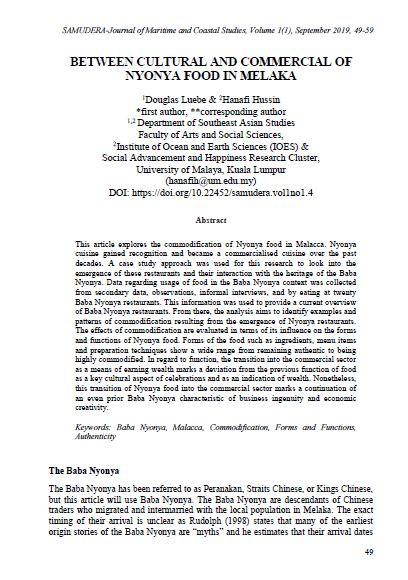BETWEEN CULTURAL AND COMMERCIAL OF NYONYA FOOD IN MELAKA
Main Article Content
Abstract
This article explores the commodification of Nyonya food in Malacca. Nyonya cuisine gained recognition and became a commercialised cuisine over the past decades. A case study approach was used for this research to look into the emergence of these restaurants and their interaction with the heritage of the Baba Nyonya. Data regarding usage of food in the Baba Nyonya context was collected from secondary data, observations, informal interviews, and by eating at twenty Baba Nyonya restaurants. This information was used to provide a current overview of Baba Nyonya restaurants. From there, the analysis aims to identify examples and patterns of commodification resulting from the emergence of Nyonya restaurants. The effects of commodification are evaluated in terms of its influence on the forms and functions of Nyonya food. Forms of the food such as ingredients, menu items and preparation techniques show a wide range from remaining authentic to being highly commodified. In regard to function, the transition into the commercial sector as a means of earning wealth marks a deviation from the previous function of food as a key cultural aspect of celebrations and as an indication of wealth. Nonetheless, this transition of Nyonya food into the commercial sector marks a continuation of an even prior Baba Nyonya characteristic of business ingenuity and economic creativity.
Keywords: Baba Nyonya, Malacca, Commodification, Forms and Functions, Authenticity
Downloads
Article Details
References
George, E. W. (2010). Intangible cultural heritage, ownership, copyrights, and tourism. International Journal of Culture, Tourism and Hospitality Research, 4(4), 376-388.
Hussin, H. (2018). Gastronomy, Tourism and Soft Power of Malaysia. SAGE Open, October-December 2018: 1–11. DOI: https://doi.org/10.1177/2158244018809211
Hussin, H. (2014). Bridging the Past and Present through Food Heritage among Peranakan Chinese of the Straits of Malacca, JATI-Journal of Southeast Asian Studies, Vol.24(1), 219-231.
Henderson, J. (2003). Ethnic heritage as a tourist attraction: The Peranakans of Singapore. International Journal of Heritage Studies, 9(1), 27-44.
Lee, S. K. (2008). The Peranakan Baba Nyonya Culture: Resurgence or Disappearance? SARI, 26, 161-170.
Othman, R. N. R., & Hamzah, A. (2013). Interdependency of Cultural Heritage Assets in the Old Quarter, Melaka Heritage City. Procedia-Social and Behavioral Sciences, 105, 577-588.
Rodzi, N. I. M., Zaki, S. A., & Subli, S. M. H. S. (2013). Between Tourism and Intangible Cultural Heritage. Procedia-Social and Behavioral Sciences, 85, 411-420.
Rudolph, J. (1998). Reconstructing Collective Identities: The Babas of Singapore. Journal of Contemporary Asia, 28(2), 203-232.
Stoddart, B. (2011). Making a New Culture on the Indian Ocean Rim: the “Peranakan” in the Straits Settlements. The Great Circle, 7-21.
Tan, C. B. (1997). Chinese identities in Malaysia. Southeast Asian Journal of Social Science, 25(2), 103-116.
Worden, N. (2003). National identity and heritage tourism in Melaka. Indonesia and the Malay world, 31(89), 31-43.
Xie, Philip Feifan. (2003) The Bamboo-beating Dance in Hainan, China: Authenticity and Commodification, Journal of Sustainable Tourism, 11(1), 5-16.
Lowenthal, D. (2005) The Past is a Foreign Country. Cambridge and New York: Cambridge University Press.
MacDonald, S. (1997). A people’s story: Heritage, identity and authenticity. Rojek, C. & Urry, J. (eds.) Touring Cultures: Transformations of Travel and Theory, 155Á/175.
Mowforth, M., & Munt, I. (1998). Tourism and sustainability: new tourism in the third world. Routledge, New York.
Tan, C. B. (1988). The Baba of Melaka: Culture and identity of a Chinese Peranakan community in Malaysia. Petaling Jaya, Malaysia: Pelanduk Publications.
Tan, C. B. (1979). Baba and Nyonya: a study of the ethnic identity of the Chinese Peranakan in Malacca. Cornell University.
